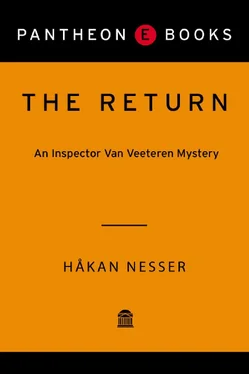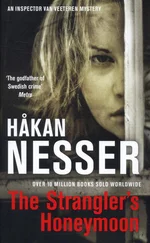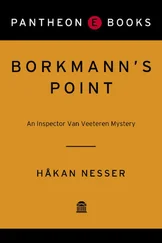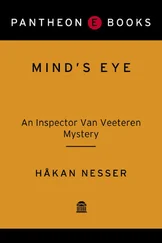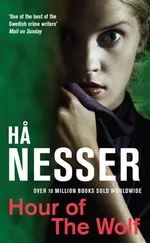Hakan Nesser - The Return
Здесь есть возможность читать онлайн «Hakan Nesser - The Return» весь текст электронной книги совершенно бесплатно (целиком полную версию без сокращений). В некоторых случаях можно слушать аудио, скачать через торрент в формате fb2 и присутствует краткое содержание. Жанр: Полицейский детектив, на английском языке. Описание произведения, (предисловие) а так же отзывы посетителей доступны на портале библиотеки ЛибКат.
- Название:The Return
- Автор:
- Жанр:
- Год:неизвестен
- ISBN:нет данных
- Рейтинг книги:5 / 5. Голосов: 1
-
Избранное:Добавить в избранное
- Отзывы:
-
Ваша оценка:
- 100
- 1
- 2
- 3
- 4
- 5
The Return: краткое содержание, описание и аннотация
Предлагаем к чтению аннотацию, описание, краткое содержание или предисловие (зависит от того, что написал сам автор книги «The Return»). Если вы не нашли необходимую информацию о книге — напишите в комментариях, мы постараемся отыскать её.
The Return — читать онлайн бесплатно полную книгу (весь текст) целиком
Ниже представлен текст книги, разбитый по страницам. Система сохранения места последней прочитанной страницы, позволяет с удобством читать онлайн бесплатно книгу «The Return», без необходимости каждый раз заново искать на чём Вы остановились. Поставьте закладку, и сможете в любой момент перейти на страницу, на которой закончили чтение.
Интервал:
Закладка:
“Lately? What do you mean by lately?”
“The last year or so,” said Rooth.
“I saw him when he came back last summer. . Let’s see now, that would have been August, I think. But he hasn’t been around here since then.”
“Tell us about it,” said Munster.
Mr. Maertens replaced his headgear and clambered out of the as-yet shallow grave.
“Well,” he began, “it was just the once. I was raking the gravel here in the churchyard. He came by taxi, got out just outside the gate. Er, then he started walking up the hill toward the woods. Went home, in other words.”
“When exactly was it?” Rooth asked.
Maertens thought for a moment.
“August, as I said. End of the month, if I remember rightly.”
“And that’s the only time you saw him?”
“Just the once, yes. God only knows where he went after that. They’d let him out again, of course. We talked about it in the village, it seemed to be about the right time, and so. .”
“Do you know if anybody else saw him?”
He nodded.
“Mrs. Wilkerson. Her husband as well, I think. They live up there.”
He pointed to the grayish white house on the edge of the forest.
“Thank you,” said Rooth. “We might need to come back
with more questions.”
“What’s he done now?” said Maertens.
“Nothing,” said Munster. “Did you know him?”
Maertens scratched the back of his head.
“In the old days, I suppose. He sort of dropped out of circulation.”
“I’d more or less gathered that,” said Rooth.
The Wilkersons appeared to have been expecting them, and that probably wasn’t surprising. The road was only about ten yards from the kitchen table where Mr. Wilkerson was now sitting with a cup of coffee and a tray of cookies in front of him, trying to look as if he was reading the newspaper. His wife produced two extra cups, and Munster and Rooth sat down.
“Thank you,” Rooth said. “I’m looking forward to this.”
“I’ve retired,” said the man, somewhat abruptly. “It’s my son who runs the farm nowadays. My back couldn’t cope, I’m afraid.”
“Backs always cause lots of trouble,” Rooth said.
“Lots.”
“Anyway,” said Munster, “we’d like to ask you a few little questions, if we may. About Leopold Verhaven.”
“Fire away,” said Mrs. Wilkerson, sitting down beside her husband. She slid the tray of cookies toward them.
“We understand he came back here in August last year,”
said Rooth, taking a cookie.
“Yes,” said Mrs. Wilkerson. “I saw him coming. Going past.”
She pointed at the road.
“Can you tell us exactly what you saw?” said Munster.
She took a sip of coffee.
“Well, I saw him walking up the hill, that’s all there was to it. I didn’t recognize him at first, but then I saw. . ”
“You’re quite certain?”
“Who else could it have been?”
“I suppose there can’t be many people using this track?”
said Rooth, taking another cookie.
“Hardly a soul,” said Mr. Wilkerson. “Only the Czermaks opposite, but there’s hardly ever anybody up in the forest.”
“Are there any other houses?” Munster wondered.
“No,” said Wilkerson. “The track peters out fifty yards or so past Verhaven’s. I suppose we might get the occasional hunting party shooting hares or pheasants, but that’s not very often.”
“Did you see him as well, Mr. Wilkerson?”
Mrs. Wilkerson nodded.
“I shouted to him, of course. Yes, we both saw him all right. The twenty-fourth of August it was. Three o’clock, maybe just after. He had a suitcase and a plastic carrier bag, that’s all. He looked just like he always did. I must say I thought he’d have changed more than he had.”
“Really?” said Rooth. “Then what?”
“What do you mean?”
“Well, you must have seen him several times?”
“No,” said Wilkerson emphatically. “We didn’t.”
Rooth took another cookie and chewed thoughtfully.
“What you are saying,” said Munster, “is that you saw Leopold Verhaven walking past here on August twenty-fourth last year-the same day that he was released from prison-but that you haven’t seen him since?”
“Yes.”
“Don’t you think that’s odd?”
Mrs. Wilkerson pursed her lips.
“There’s a lot about Leopold Verhaven that’s odd,” she said. “Don’t you agree? What’s happened?”
“We don’t know yet,” said Rooth. “Was there anybody in the village who mixed with him at all?”
“No,” said Wilkerson. “Nobody.”
“You must have gathered that,” said his wife.
Yes, I’ve started to, thought Munster. He was beginning to feel cooped up in this over-elaborately furnished and deco-rated little kitchen, and was coming around to the view that it would probably be best to save other questions for a later occasion. Until they had a bit of flesh on the skeleton, as it were. At the very least until they were certain that Leopold Verhaven really was their man.
Their dead body. It would be damned annoying if he suddenly crawled out from under a stone and disproved his own demise, as it were.
Although Munster was becoming more and more con-
vinced for every hour that passed. It couldn’t very well be anybody else. There are signs and there are signs, as Van Veeteren always said.
Rooth seemed to have read his thoughts. And in any case, the tray of cookies was empty.
“We might have to come back to you,” he said. “Many
thanks for the coffee.”
“It’s a pleasure,” said Mrs. Wilkerson.
As they were leaving, Munster asked a question out of nowhere.
“We spoke to the storekeeper,” he said. “He seemed to be. . uncomfortable, to say the least. Have you any idea why?”
“Of course,” said Mrs. Wilkerson curtly. “Beatrice was his cousin, after all.”
“Beatrice,” said Rooth as they were walking back to the house.
“She was the first one. Nineteen sixty-two, was it?”
“Yes,” said Munster. “Beatrice in 1962 and Marlene in 1981.
Nearly twenty years between them. It’s a very peculiar story, this one is-have you realized that?”
“I know,” said Rooth. “I had the impression that it was all cut and dried, but I have to say that I’m not so sure about that now.”
“What do you mean by that, Inspector?” asked Munster.
“Nothing,” said Rooth. “Let’s see what the technical guys have come up with. Kluisters and Berben have been hard at work, by the looks of things.”
13
“Welcome to the gang,” said Rooth.
DeBries flopped down onto the chair and lit a cigarette.
The smoke immediately started to irritate Rooth’s eyes, but he decided to put a brave face on it.
“I would be grateful if my good friend the inspector would be so kind as to put me in the picture,” said deBries. “Slowly and clearly, if you don’t mind. I was sitting wide awake in a car all night, keeping an eye on a house.”
“Did anything come of it?” Rooth wondered.
“I should say so,” said deBries. “The house is still there.
How long have you been growing that thing, by the way?”
“What thing?”
“That thing you have on your face. . It reminds me of something, but I can’t put my finger on it. Oh yes, that’s it! Pat Boone!”
“What the hell are you on about?”
“My guinea pig, of course. That I had when I was a boy. He caught some virus or other and his fur fell out. He looked a bit like that just before he died.”
Rooth sighed.
“Very funny,” he said. “How old are you?”
“Forty, feel like eighty. Why?”
Rooth scratched his armpits thoughtfully.
Читать дальшеИнтервал:
Закладка:
Похожие книги на «The Return»
Представляем Вашему вниманию похожие книги на «The Return» списком для выбора. Мы отобрали схожую по названию и смыслу литературу в надежде предоставить читателям больше вариантов отыскать новые, интересные, ещё непрочитанные произведения.
Обсуждение, отзывы о книге «The Return» и просто собственные мнения читателей. Оставьте ваши комментарии, напишите, что Вы думаете о произведении, его смысле или главных героях. Укажите что конкретно понравилось, а что нет, и почему Вы так считаете.
